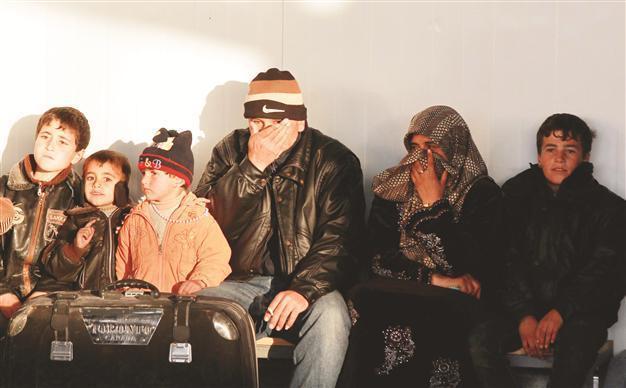Brahimi calls for transition government
DAMASCUS / PARIS

Syrian refugees wait to register their names in Zaatari camp, Jordan. REUTERS photo
International peace envoy Lakhdar Brahimi called yesterday for “real change” and a transitional government in Syria, but the armed opposition and France swiftly retorted that that such an administration could not include President Bashar al-Assad or his top lieutenants.The envoy unveiled his initiative in Damascus as Russia, the Syrian regime’s most powerful ally, denied the existence of a joint peace plan with the United States, amid a flurry of year-end diplomatic activity to try to end the bloody 21-month conflict.
“Change should not be cosmetic, the Syrian people need and require real change, and everyone understands what that means,” the U.N.-Arab League envoy said on the fifth and final day of his latest peace mission to Syria.
“We need to form a government with all powers ... which assumes power during a period of transition. That transition period will end with elections,” Brahimi said. He did not specify a date for the envisaged elections, either presidential or parliamentary depending on what could be agreed. He also made no mention on the fate of al-Assad, whose current term expires in 2014.
“The transition period should not lead to the collapse of the state and its institutions,” Brahimi said, adding the initiative was incomplete. The armed opposition National Coalition and Western governments that recognize it reiterated that no transition that gave a role to al-Assad and his inner circle would be acceptable.
“We will accept any political solution that does not include the al-Assad family and those who harmed the Syrian people,” National Coalition spokesman Walid al-Bunni told a press conference in Istanbul. “Our first condition for them is to leave the country.”
France, which was the first Western government to recognize the opposition grouping as the sole legitimate representative of the Syrian people, said al-Assad should not have any role in a transition, accusing him of “still ferociously repressing his people.”
Russia, which to the fury of the West has refused to cut cooperation with Damascus, hosted a Syrian delegation headed by Deputy Foreign Minister Faisal Muqdad, ahead of talks on Dec. 29 with Brahimi.
“This is of course a part of the efforts we are undertaking to encourage dialogue not just with the government but all opposition forces,” Foreign Ministry spokesman Alexander Lukashevich said.
Moscow denied reports of a new initiative with Washington that would see al-Assad stay in power until 2014 while preventing him from renewing his mandate. “There was not and is not such a plan and it is not being discussed,” Lukashevich said, adding that Russia’s policy was still based on a Geneva accord reached in June between world powers for an inter-Syrian dialogue.
The accord called for a sustained cease-fire, transitional government, a Syria-driven peace process and review of the Constitution, but has fallen by the wayside as it left open the question of al-Assad’s fate.
















